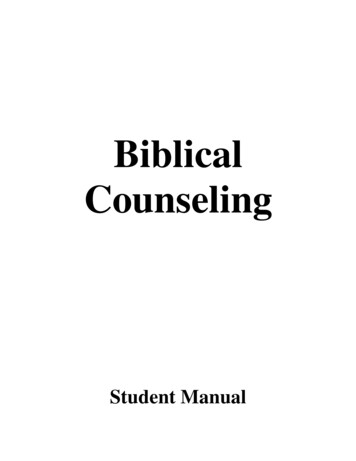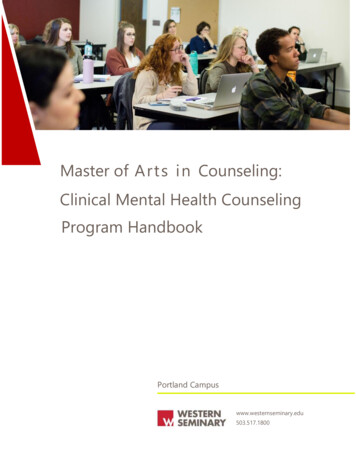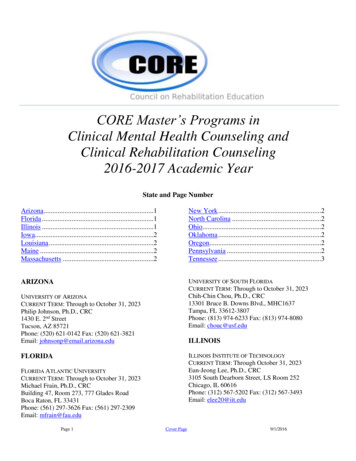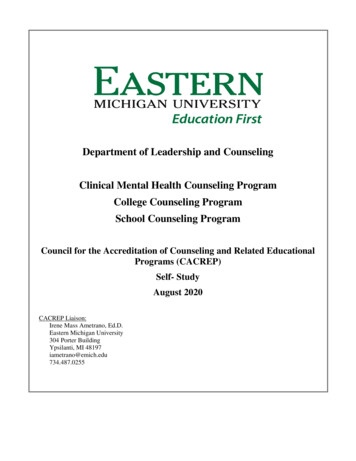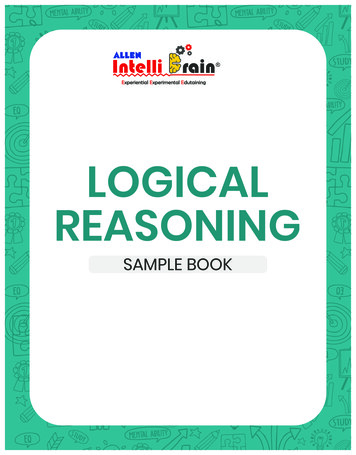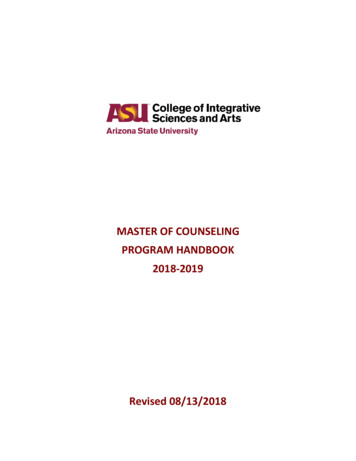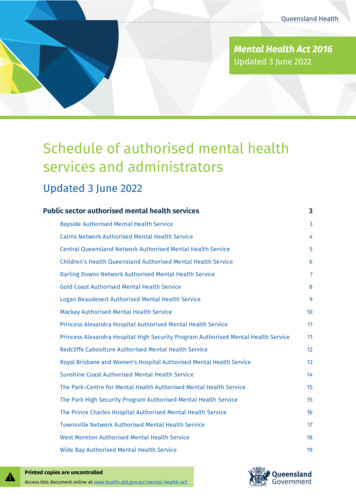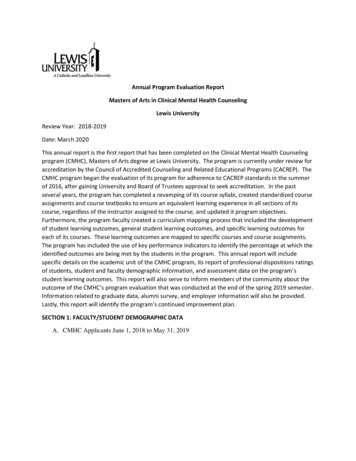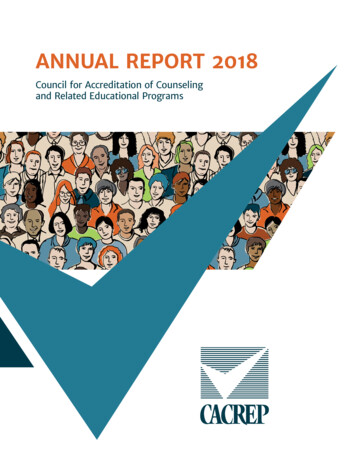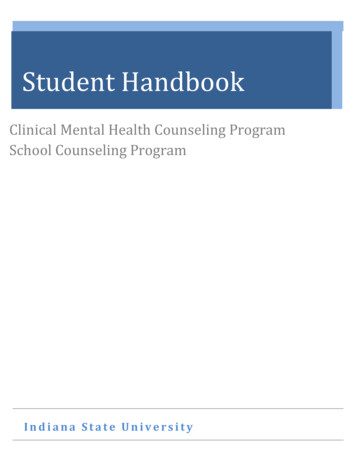
Transcription
Student HandbookClinical Mental Health Counseling ProgramSchool Counseling ProgramIndiana State University
STUDENT HANDBOOKClinical Mental Health Counseling ProgramSchool Counseling ProgramDepartment of Applied Clinical and Educational SciencesINDIANA STATE UNIVERSITYTerre Haute, IndianaChris MacDonald, Ph.D. Chairperson,Department of Applied Clinical and Educational SciencesNathaniel J. Wagner, Ph.D., Coordinator, Clinical Mental Health Counseling ProgramTonya Balch Ph.D., Coordinator, School Counseling unselingMay 2020(10th Edition)2
Table of ContentsUniversity Mission Statement . 5We transform the lives of students through a high-quality education infused with experiential learning, community engagementand career-readiness. Our students succeed within a culture of inclusion and support that provides the skills and knowledge toimpact Indiana and beyond. . 5University Value Statements . 5Indiana State is committed to these core values:. 5BAYH COLLEGE OF EDUCATION MISSION STATEMENT . 5DIVERSITY STATEMENT . 7PROGRAM OBJECTIVES . 8ACCREDITATION . 8PROFESSIONAL AND ETHICAL BEHAVIOR . 9COMPREHENSIVE EVALUATION OF STUDENT PROGRESS . 9STUDENT GRIEVANCE PROCEDURES . 11TRANSFER CREDIT . 11RETENTION . 12CONTINUOUS ENROLLMENT/READMISSION. 13FINANCIAL ASSISTANCE. 14STATEMENT ON NON-DISCRIMINATION, HARRASSMENT, AND SEXUAL MISCONDUCT . 14PROFESSIONAL LICENSURE . 15SCHOOL COUNSELING. 15GRADUATES OF THE CLINICAL MENTAL HEALTH COUNSELING PROGRAM ARE ELIGIBLE TO BECOMELICENSED MENTAL HEALTH COUNSELOR – ASSOCIATE (LMHC-A) IN INDIANA LEADING TO THE LICENSEDMENTAL HEALTH COUNSELOR (LMHC). MORE INFORMATION IS AVAILABLE AT THE INDIANAPROFESSIONAL LICENSING AGENCY. ADDITIONAL REQUIREMENTS MAY NEED TO BE FULFILLED TO APPLYFOR A LICENSE IN OTHER STATES. CHECK WITH THE LICENSING AGENCY FOR THE STATE IN WHICH YOUPLAN TO BECOME LICENSED FOR FURTHER INFORMATION. APPLICANTS SHOULD DISCUSSDOCUMENTATION NEEDS WITH THE APPROPRIATE PROGRAM DIRECTOR WELL IN ADVANCE OFGRADUATION. . 15PROFESSIONAL ORGANIZATIONS . 15AMERICAN COUNSELING ASSOCIATION (ACA) . 16OTHER PROFESSIONAL ORGANIZATIONS. 16CHI SIGMA IOTA. 16IOTA SIGMA TAU CHAPTER . 16LIABILITY INSURANCE . 17FACULTY AND STAFF INFORMATION . 17FACULTY. 17STAFF . 19BALL, DORI . 19CRAMER, PAULA. 19PROGRAM MISSION STATEMENT . 22PROGRAM DESCRIPTION . 22ADVISEMENT . 22PLANNING A PROGRAM OF STUDY. 22STUDENT COURSE LOAD . 22PROGRAM REQUIREMENTS - THE CURRICULUM . 23ROTATING CONTENT . 23ILLUSTRATIVE SCHEDULE OF STUDY . 24THESIS OPTION . 243
CLINICAL EXPERIENCE . 25Practicum Training . 25Internship Training . 26Agency Supervisors . 27Agency Benefits . 27COMPREHENSIVE CLINICAL EXAMINATION . 27LICENSURE EXAMINATION . 30CREDENTIALING AND EMPLOYMENT RECOMMENDATION PROCEDURES . 30APPENDIX A – STUDENT EVALUATION FORMS . 31SCHOOL COUNSELING. 39MISSION STATEMENT . 40PROGRAM DESCRIPTION . 40THE SCHOOL COUNSELING PROGRAM IS A 48 SEMESTER CREDIT HOURS THAT INCLUDES 760 HOURS OF FIELD-BASED EXPERIENCES.COMPLETION OF THE PROGRAM AND PASSING THE INDIANA CORE ASSESSMENT FOR SCHOOL COUNSELORS WILL LEAD TO LICENSUREIN INDIANA. THE PROGRAM COORDINATOR VERIFIES PROGRAM COMPLETION WITH EDUCATION STUDENT SERVICES. . 40THE SCHOOL COUNSELING PROGRAM ADMITS STUDENTS ONCE A YEAR EACH MARCH. STUDENTS GO THROUGH THE PROGRAMTOGETHER IN A COHORT. DURING THE SUMMER SESSIONS, CLASSES USUALLY MEET EVERY DAY DURING THE WEEK. DURING THEFALL AND SPRING SEMESTERS THE SCHOOL COUNSELING COHORT MEETS ONE SATURDAY PER MONTH ON CAMPUS AT INDIANASTATE. CLASSES USUALLY RUN FROM 9-5 ON SATURDAYS. BETWEEN THE MONTHLY CLASS MEETINGS, STUDENTS TO WORK ON-LINEAND MEET WITH THEIR SUPERVISORS ON THE INTERNET AND AT AGREED SITES IN THEIR AREA. STUDENTS ESTABLISH A TWO-YEARFIELD PRACTICE RELATIONSHIP WITH AN ELEMENTARY, MIDDLE SCHOOL, AND HIGH SCHOOL. . 40ADVISEMENT . 40PLANNING A PROGRAM OF STUDY. 40GENERAL INFORMATION . 40PROGRAM OF STUDY . 40ON-SITE SUPERVISOR BASICS. 45LICENSURE . 45DURING THE SPRING SEMESTER OF INTERNSHIP, STUDENTS WILL BE ENCOURAGED TO CREATE AN ACCOUNT THROUGH LVIS ON THEINDIANA DEPARTMENT OF EDUCATION’S WEBSITE. THEY WILL POST ALL REQUIRED ELEMENTS FOR LICENSURE. WHEN THERECOURSEWORK IS DONE OR NEARLY DONE, THEY WILL REGISTER AND TAKE THE CORE ASSESSMENT TO OBTAIN THEIR LICENSE AS ASCHOOL COUNSELOR IN INDIANA. THE PROGRAM DIRECTOR WILL NOTIFY EDUCATION STUDENT SERVICES OF STUDENTSCOMPLETING THEIR MASTER’S DEGREE IN SCHOOL COUNSELING WHO ARE ELIGIBLE FOR LICENSURE. . 45CREDENTIALING AND EMPLOYMENT RECOMMENDATION PROCEDURES . 45RECOMMENDATIONS FOR CREDENTIALING AND/OR LICENSURE AND EMPLOYMENT WILL BE PROVIDED FOR STUDENTS WHO (1)RECEIVE FAVORABLE FACULTY PROGRAM EVALUATIONS AND (2) COMPLETE ALL DEGREE REQUIREMENTS, INCLUDING FIELDEXPERIENCE REQUIREMENTS. . 45APPENDIX B STUDENT EVALUATION FORMS . 464
University Mission StatementWe transform the lives of students through a high-quality education infused with experiential learning,community engagement and career-readiness. Our students succeed within a culture of inclusion andsupport that provides the skills and knowledge to impact Indiana and beyond.University Value StatementsIndiana State is committed to these core values:We prepare the next generation of leaders and citizens by providing personalized andtransformative experiences that lead to success in the classroom and beyond.Discovery: We nurture intellectual curiosity and growth through the creation of new knowledge andthe joy of enhanced human understanding.Engagement: We collaborate with our local and global communities to create long-term relationships,connectedness with integrity, and a shared sense of pride.Inclusiveness:We take action to honor the diversity of individuals, ideas and expressions, ensuring theyare genuinely recognized, valued, and lived.Learning:Bayh College of Education Mission StatementWe are the Bayh College of Education: Daring to do the difficult work that makes change possible.We Value RelevanceWe are deeply connected to our communities and professions, identifying the needs that exist andanticipating the promise and possibility of our future. Through authentic conversations and evolvingpractices, we demonstrate that we are genuine.Diversity, Equity, and InclusionWe affirm the inherent worth of every individual by providing supportive environments that empowereach to thrive. By what we teach and how we practice, we foster cultural humility.The Power of Learning to TransformAs transformational educators, we help individuals discover the intrinsic value of learning. We focus onwho we can become and create opportunities for growth. We dare to change lives through education.The Intersection of Theory, Research, and PracticeWe promote vulnerability in acknowledging strengths and areas for personal and programmatic growth,intellectual curiosity, and a willingness to fail forward.Conceptual FrameworkBecoming a Complete ProfessionalThe overarching theme of Indiana State University’s educator preparation programs is “Becoming aComplete Professional.” Initially adopted in 1991, today our theme encompasses three broad areas thatrecognize essential areas of the work of an educator: Educator as Expert or Mediator of Learning,Educator as Person, andEducator as Member of Communities.5
The word complete in the title acknowledges that, to be truly successful, an educator must be effective inall three of these areas. Similarly, the word becoming is included in the title because new graduates,alumni, and our faculty are never fully finished with their learning in their profession as a teacher,counselor, school psychologist, speech language pathologist, principal, or superintendent.The component “Educator as Expert or Mediator of Learning” deals with an educator’s professional skill asa mediator of students’ learning and/or of the progress individuals make in achieving their potential. Thecomponent “Educator as Person” represents the traits and dispositions that make a successful educatorjustifiably respected and emulated by students. The component “Educator as Member of Communities”reflects the necessity of contributing to the various communities of which educators, as professionals, aremembers. To be proficient, an educator cannot simply be skillful as a mediator of learning or simply berespected and emulated by students or simply be a contributing member of relevant communities. Instead, atruly successful educator must at the same time be a competent expert or mediator of learning, a personcommitted to social justice and viewed as worthy of respect and even emulation by students, and acontributing member of the communities in which educators are expected to function.Department of Applied Clinical and Educational SciencesMission StatementActively challenging, engaging, and supporting our students and colleagues to excel.Vision StatementOur department is a learning community comprised of faculty, staff, and students who are welcoming,supportive, and nurturing. We value diversity in all forms, and actively seek to understand otherperspectives and ways of knowing. Our engagement with diverse ideas stimulates innovation in theclassroom, in our research, and in service both on and off campus. An important aspect of our programs isan ongoing partnership within the broader community, and collaboration with institutes of higher learningaround the world.Our faculty and students constitute a department of excellence due, in part, to our promotion of critical andcreative thinking about complex problems. Faculty members and students are highly engaged with thecontent and process of teaching and learning, both in the classroom and in the larger community. Facultymembers and students actively seek ways to employ technology creatively to further enhance teaching,research, and service. Due to our proactive and trendsetting practices, students are assured of positiveeducational outcomes, and are motivated to become lifelong learners.ValuesWe value: Active EngagementWe stimulate active engagement to ensure relevant teaching and scholarship as well as purposeful service.Active engagement serves as our foundation for teaching and learning. Excellence6
We strive for excellence in every aspect of our professional practice including quality teaching, meaningfulscholarship, and intentional service through a lens of inclusive practices which honors the different voiceswithin the college and the communities we serve. Critical ThoughtWe foster critical thinking to support and challenge ourselves and others. Through critical thought, we aimto broaden our perspective to positively impact the learning environment. IntegrityWe are committed to integrity. Integrity serves as our overarching guide in our interactions with others andour commitment to students, colleagues, and communities. Social JusticeWe promote access, equity, and participation for all individuals. We are strong advocates for social,political, economic, and cultural change at the systems level to better our world.Diversity StatementDiversity enriches us and calls us to action. We affirm that diversity in the teaching and learning processheightens our effectiveness as professionals, citizens, and social justice advocates. We continually strive toenhance a departmental culture of inclusiveness, as we engage with the different voices that comprise ourlocal, national and global societiesThe Sycamore StandardStudents at Indiana State University are expected to accept certain personal responsibilities that constitutethe "standard" for behavior in a community of scholars.As a student at Indiana State University:I will practice personal and academic integrity; I will commit my energies to the pursuit of truth,learning, and scholarship; I will foster an environment conducive to the personal and academicaccomplishment of all students; I will avoid activities that promote bigotry or intolerance; I will chooseassociations and define my relationships with others based on respect for individual rights and humandignity; I will conduct my life as a student in a manner that brings honor to me and to the UniversityCommunity; I will discourage actions or behaviors by others that are contrary to these standards.Counseling Programs Mission StatementDevelop counseling professionals to promote well-being, educate, and serve others.Vision StatementThe counseling area is a supportive and welcoming learning community committed to the preparation ofcompetent entry and advanced level practitioners. Critical aspects of our programs are outreach and7
engagement within the broader community and experiential learning in a variety of contexts, which includeagencies, schools, and other settings where counselors provide professional services.Values1. We value excellence in practice.Responsive Actions: Recruit highly qualify individualsFacilitate experiential learning within a multitude of settingsEmphasize academic rigor to include both coursework and field experiencesPromote creative, critical and independent thinkingSynthesize theory, research, and practice2. We value diversity.Responsive Actions: Affirm the diversity of individuals, ideas, and expressionsPromote authentic practice with diverse populationsDemonstrate culturally competent practice3. We value professionalism.Responsive Actions: Endorse and model a culture of professional behaviorEmbrace identity as complete professionalsDemonstrate moral, ethical, and legal behaviorProgram ObjectivesThe program objectives below provide the basis for evaluating the Clinical Mental Health Counseling andSchool Counseling programs. The learning outcomes are based on standards from national professionalorganizations and their respective accrediting bodies.1. Students will develop a knowledge base relevant to their profession.2. Students will develop knowledge and skill relevant to scholarly activity research and inquiry.3. Students will develop knowledge of diversity in their academic career at ISU.4. Students will develop appropriate counseling knowledge and skills.5. Students will develop knowledge of professional ethics and standards based on applicable professionalorganizations and other applicable ethical standards (such as state licensure standards). In addition,students will apply these ethics and standards in their professional practice.6. Students will develop an appropriate professional identification.7. Students will demonstrate the disposition necessary to be an effective counselor and advocate.AccreditationThe Clinical Mental Health Counseling and School Counseling Programs are accredited by the Council forAccreditation of Counseling and Related Educational Programs (CACREP), a specialized accrediting body8
recognized by the Council for Higher Education Accreditation (CHEA). The Clinical Mental Health CounselingProgram has been granted accreditation under the Mental Health Counseling Standards and the SchoolCounseling program has been granted accreditation under the School Counseling Standards. Each programobtained accreditation valid through 2020. Any changes in CACREP standing will be communicated to studentsin a timely manner.Academic IntegrityStudents are expected to adhere to the Code of Student Conduct. These standards are listed on the College ofGraduate and Professional Studies under the Academic Integrity tab. Among other topics, the Code of StudentConduct covers matters related to academic honesty, plagiarism, and cheating. In addition, all students shouldbecome familiar with the Publication Manual of the American Psychological Association’s definition ofplagiarism and avoid behavior that would constitute plagiarism. It is the students’ responsibility to be familiarwith the guidelines within this code. Please review the standards at l and Ethical BehaviorWith regard to the Clinical Mental Health Counseling and School Counseling programs, the Counseling Area atIndiana State University has adopted the ACA Code of Ethics and Standards of Practice and the ASCA EthicalStandards as the principles for governing the professional behavior of its respective students. In addition,applicable professional specialty standards are implemented within the various programs. Students are expectedto display the highest levels of professional and ethical behavior in their academic and clinical experiences.Students should be aware that conduct in their personal lives, including social media, can impact theirprofessional career. Students are encouraged to seek clarity from faculty members and auxiliary professionalresources (e.g. Indiana law, policy and code, site supervisors) when they have questions regarding professionaland ethical behavior. The ACA Code of Ethics and Standards of Practice and ASCA Ethical Standards can befound at their websites.Comprehensive Evaluation of Student ProgressStudents in counseling training programs should know at the outset of training that their faculty, training staff,and supervisors have a professional, ethical, and potential legal obligation to: (a) evaluate the interpersonalcompetence and emotional well-being of student trainees who are under supervision, and who provide servicesto clients, PK-12th grade students, and consumers, and (b) ensure, insofar as possible, that the trainees whocomplete their programs are competent to manage future relationships (e.g., K-12th grade students, client,collegial, professional, public, scholarly, and supervisory) in an effective and appropriate manner. Because ofthis commitment, departmental faculty, training staff, and supervisors strive not to "pass along" students withissues or problems (e.g., cognitive, emotional, psychological, interpersonal, technical, and ethical) that mayinterfere with professional competence to other programs, the profession, employers, or the public at large.Therefore, (c) within a developmental framework and with due regard for the inherent power differencebetween students and faculty, students should know that their faculty, staff, and supervisors will evaluate theircompetence and conduct in a variety of areas such as personal disposition assessment, knowledge, skills,assistantships (if applicable), comprehensive examinations, and related program requirements.These evaluative areas will also include, but not be limited to, demonstration of sufficient:9
interpersonal and professional competence (e.g., the ways in which students relate to K-12th gradestudents, clients, peers, faculty, allied professionals, the public, and individuals from diversebackgrounds or histories)self-awareness, self-reflection, and self-evaluation (e.g., potential impact of one's own beliefs and valueson clients, peers, faculty, allied professionals, the public, and individuals from diverse backgrounds orhistories)content knowledge (e.g. ongoing intentional, sequential building of knowledge through a comprehensiveprogram of study)counseling skill (e.g. techniques, interviewing, assessment, treatment monitoring, documentation,collaboration, termination)openness to processes of supervision (e.g., the ability and willingness to explore issues that eitherinterfere with the appropriate provision of care or impede professional development and functioning)resolution of problems or issues that interfere with professional development or functioning in asatisfactory manner (e.g., by responding constructively to feedback from supervisors or program faculty;by participating in personal counseling in order to resolve problems or issues), andgraduate student professional identity (e.g. time management skills, class attendance, engagedparticipation, appropriate peer relationships, overall disposition).ProcedureThe following guidelines articulate how the above aspects are systematically monitored and evaluated whilestudents are enrolled in counseling programs in the Counseling Area at Indiana State University.1. All incoming students will be presented with a student handbook that includes this retention and evaluationpolicy.2. All students will be regularly evaluated. This process will involve the evaluation of student's academic,clinical, and intrapersonal/ interpersonal functioning. Those students with an assistantship will also beevaluated in this area.3. Results of this evaluation are provided to all students. Notification will include the faculty's evaluation of thestudent's progress in academic, clinical, and intrapersonal/interpersonal functioning. When areas of concern areidentified or performance does not meet expectations, notification will follow University due processguidelines.4. Faculty may review a student prior to the regular evaluation if there are concer
completion of the program and passing the indiana core assessment for school counselors will lead to licensure in indiana. the program coordinator verifies program completion with education student services. . 40 the school counseling program admits students once a year each march. students go through the program
